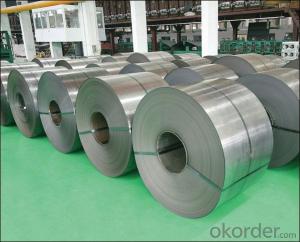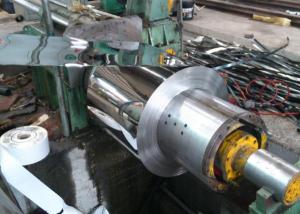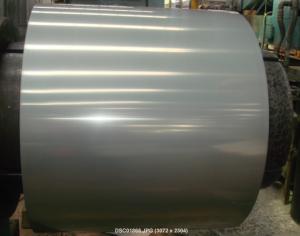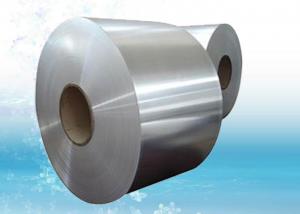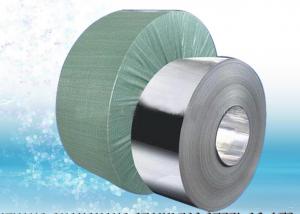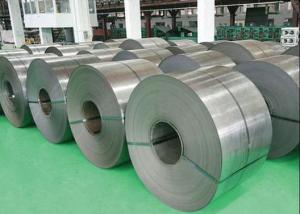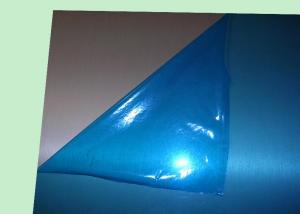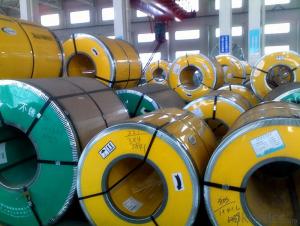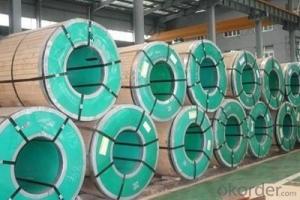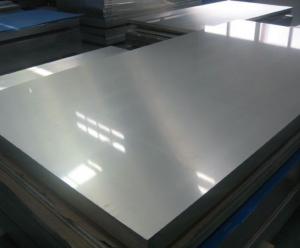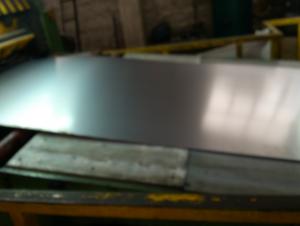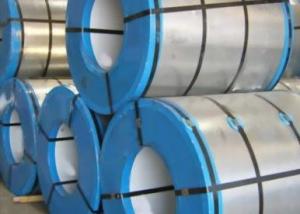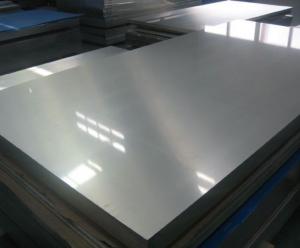Hot Rolled Stainless Steel Coil 201 Narrow Strip No.1 Finish
OKorder Service Pledge
OKorder Financial Service
You Might Also Like
Hot Rolled Stainless Steel Coil 201 Narrow Strip No.1 Finish
Hot Rolled Stainless Steel 201 half copper Chemical Composition(%) |
| |||||||
C | Si | Mn | P | S | Ni | Cr | Cu |
|
0.1 | 0.5 | 10 | 0.04 | 0.01 | 1.20/1.30 | 13.00/14.00 | 0.8/1.0 |
|
Grade: | 200 Series | Standard: | JIS,AISI,ASTM,GB,DIN | Thickness: | 2.5/3.0/4.0mm |
Width: | 485/510/550/610/1010/1240mm | Place of Origin: | Shanghai China (Mainland) | Brand Name: | CNBM |
Model Number: | 201 | Technique: | Hot Rolled | Application: | Industrial tubes/kitchen/bath |
Certification: | ISO | THK: | 2.5/3.0/4.0mm | Face: | No.1 |
Usage: | tubes/kitchen/bath | Origin: | CHINA | ||
Packaging Detail: For customer's requirement
Delivery Detail:10-30days
201 Hot Rolled Stainless Steel Coil Specifications
THK:2.3/2.5/3.0/4.0mm
Width:485/510/550/610/1010/1240mm
Face:No.1
201 Hot rolled stainless steel Coil Application
Stainless steel is a production which not easy rust,acid resistance and corrosion resistance,so it is widely
used in light industry,heavy industry,daily necessities and the decoration industry.
201 hot rolled stainless steel coil, use to produce cold rolled stainless steel coil and stainless steel tube, pipe.
201 Hot Rolled Stainless Steel Coil
Strength Of Extension:100,000 To 180,000 Psi;
Yield Strength:50,000 To 150,000 Psi
Elongation :55 To 60%;
Modulus Of Elasticity:29,000,000 Psi;
Density :.280lbs/Cubic Inch(7.93g/Cm3)
- Q:Can stainless steel strips be customized according to specific requirements?
- Certainly! Stainless steel strips have the capability to be personalized in accordance with specific needs. Stainless steel, being a flexible material, can be easily molded, trimmed, and modified into diverse forms and dimensions. This permits customization to fulfill particular requirements, including width, thickness, length, and surface quality. Furthermore, stainless steel strips can undergo additional customization through techniques such as slitting, edge treatment, and surface refinement to enhance their functionality and aesthetics. Regardless of whether it is for industrial, architectural, or decorative purposes, stainless steel strips can be meticulously tailored to precisely match the specifications and demands of a specific application.
- Q:Can stainless steel strips be used in pharmaceutical industries?
- Yes, stainless steel strips can be used in pharmaceutical industries. Stainless steel is a preferred material in pharmaceutical manufacturing due to its excellent corrosion resistance, high strength, and durability. It is used in various applications such as equipment fabrication, storage tanks, piping, and fittings. Stainless steel is easy to clean and sterilize, which is crucial in maintaining the highest levels of hygiene and preventing contamination in pharmaceutical production environments. Additionally, stainless steel strips offer versatility in terms of size, thickness, and surface finishes, making them suitable for a wide range of pharmaceutical industry requirements.
- Q:Can stainless steel strips be used in the production of electrical connectors?
- Yes, stainless steel strips can be used in the production of electrical connectors. Stainless steel is a highly versatile material that offers excellent mechanical properties, such as high strength, durability, and corrosion resistance. These qualities make it suitable for various applications, including electrical connectors. Stainless steel strips can be fabricated into precise shapes and sizes, allowing for the production of connectors with tight tolerances. Additionally, stainless steel's resistance to oxidation and corrosion ensures the longevity and reliability of the connectors, even in harsh environments. Overall, stainless steel strips are a viable material choice for the production of electrical connectors.
- Q:Can stainless steel strips be used in telecommunications applications?
- Telecommunications applications can indeed make use of stainless steel strips. The reason for this is that stainless steel possesses exceptional corrosion resistance and durability, rendering it appropriate for diverse industries, including telecommunications. Its usefulness in telecommunications extends to various applications such as cable trays, cable conduits, antenna brackets, enclosures, and support structures. Due to their high strength-to-weight ratio, ability to withstand extreme temperatures, and capacity for electromagnetic interference (EMI) shielding, stainless steel strips are frequently favored in telecommunications. Furthermore, they can be readily fabricated and tailored to meet specific needs, making them a versatile option for telecommunications applications.
- Q:Are stainless steel strips suitable for medical equipment?
- Yes, stainless steel strips are suitable for medical equipment. Stainless steel is known for its durability, corrosion resistance, and ease of sterilization, making it an excellent choice for medical applications where cleanliness and hygiene are crucial. Additionally, stainless steel's ability to withstand extreme temperatures and pressures further enhances its suitability for medical equipment.
- Q:Can 111 stainless steel strips be bent or formed without cracking?
- Yes, 111 stainless steel strips can be bent or formed without cracking, as stainless steel is known for its excellent formability and ductility. However, the specific bending or forming process, as well as the thickness and condition of the stainless steel strips, should be taken into consideration to ensure successful results.
- Q:How do stainless steel strips resist corrosion?
- Stainless steel strips resist corrosion due to the presence of chromium in their composition. Chromium forms a thin, protective layer of chromium oxide on the surface of the steel when exposed to oxygen. This layer acts as a barrier, preventing further oxidation and corrosion from occurring. Additionally, stainless steel also contains other alloying elements such as nickel and molybdenum, which further enhance its corrosion resistance properties. These elements help to increase the passivity of the chromium oxide layer, making it more stable and less prone to breakdown. This inherent corrosion resistance makes stainless steel strips suitable for various applications in industries such as construction, automotive, and aerospace, where exposure to moisture, chemicals, and other corrosive agents is common.
- Q:Can stainless steel strips be used in outdoor signage?
- Yes, stainless steel strips can be used in outdoor signage. Stainless steel is highly resistant to corrosion and weathering, making it a durable material for outdoor applications. It can withstand exposure to harsh environmental conditions, including rain, sunlight, and temperature fluctuations, without losing its aesthetic appeal or structural integrity. Furthermore, stainless steel is easily customizable and can be engraved, etched, or painted to create attractive and long-lasting outdoor signage.
- Q:What are the main properties of stainless steel strips?
- Stainless steel strips possess a multitude of desirable properties, making them highly sought after in a wide array of applications. To begin with, their exceptional resistance to corrosion is well-known. This resistance is primarily attributed to the presence of chromium in the steel, which creates a passive layer on the material's surface, safeguarding it against oxidation and corrosion. As a result, stainless steel strips can endure exposure to harsh environments, such as saltwater or acidic substances, without succumbing to rust or deterioration. Moreover, stainless steel strips demonstrate outstanding strength and durability. They boast a high tensile strength, enabling them to withstand significant stress and pressure without warping or fracturing. This renders them suitable for applications that necessitate structural integrity, such as in the construction or automotive industries. Additionally, stainless steel strips offer exceptional heat resistance. They retain their strength and structural integrity even when subjected to high temperatures, making them ideal for applications with heat exposure concerns, such as furnaces or exhaust systems. Another noteworthy property of stainless steel strips is their hygienic nature. Being non-porous and easy to clean, they prevent the growth of bacteria or other harmful microorganisms. Consequently, stainless steel strips find extensive use in the food and medical industries, where cleanliness and hygiene are of paramount importance. Lastly, stainless steel strips exhibit remarkable versatility and customizability. They can be fabricated into various shapes, sizes, and finishes to meet precise application requirements. Furthermore, they can be effortlessly welded, formed, or machined, facilitating simple assembly and customization during manufacturing processes. In conclusion, stainless steel strips possess exceptional corrosion resistance, high strength, heat resistance, hygienic properties, and versatility. These attributes establish stainless steel strips as the preferred choice in industries ranging from construction and automotive to food and medical.
- Q:Can stainless steel strips be used for automotive fasteners?
- Yes, stainless steel strips can be used for automotive fasteners. Stainless steel is a popular choice for automotive fasteners due to its high strength, corrosion resistance, and durability. It is able to withstand harsh environmental conditions and is less prone to rust and corrosion compared to other materials like carbon steel. Stainless steel strips can be formed into various shapes and sizes to meet the specific requirements of automotive fasteners, such as bolts, screws, nuts, and washers. Additionally, stainless steel fasteners provide an aesthetically pleasing finish and are often used in visible applications. Overall, stainless steel strips are a reliable and versatile choice for automotive fasteners.
1. Manufacturer Overview |
|
|---|---|
| Location | |
| Year Established | |
| Annual Output Value | |
| Main Markets | |
| Company Certifications | |
2. Manufacturer Certificates |
|
|---|---|
| a) Certification Name | |
| Range | |
| Reference | |
| Validity Period | |
3. Manufacturer Capability |
|
|---|---|
| a)Trade Capacity | |
| Nearest Port | |
| Export Percentage | |
| No.of Employees in Trade Department | |
| Language Spoken: | |
| b)Factory Information | |
| Factory Size: | |
| No. of Production Lines | |
| Contract Manufacturing | |
| Product Price Range | |
Send your message to us
Hot Rolled Stainless Steel Coil 201 Narrow Strip No.1 Finish
OKorder Service Pledge
OKorder Financial Service
Similar products
New products
Hot products
Related keywords
